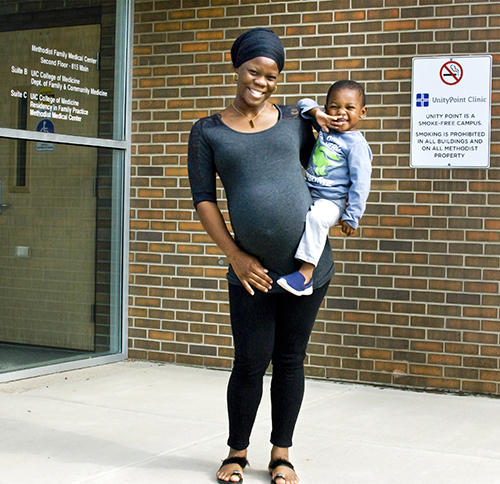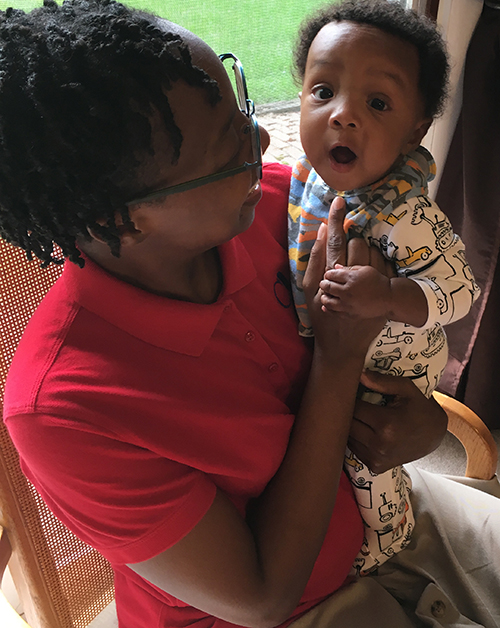
Mutiat Mabifa, 34, and her son Abdul-Lateef, 2, leave UnityPoint Family Medicine Clinic after a CenteringPregnancy session. Mabifa, an RN, recognizes the value the program provides women by helping to assure full-term births. (PHOTO BY CLARE HOWARD)
Medical research has carefully documented the risk of high blood pressure, high cholesterol, obesity, smoking, lack of exercise and more. But the health risk of racism was largely ignored.
Statistics, however, are now emerging –– African American women are at higher risk of maternal mortality, premature and low-birth weight babies. The number of women who die in childbirth is declining globally, but in the United States, maternal mortality is on the rise.
“To Prevent Women from Dying in Childbirth, First Stop Blaming Them,” was the headline of a recent article in Scientific American.
The article stated, “Two-thirds of all U.S. maternal deaths are considered preventable. Racism –– not race –– is a critical factor.”
Black women in America are three to four times more likely to die from pregnancy-related conditions. The risk is not genetic or biological and is not altered by income, education or geography. It appears to be strictly based on racism and the lifetime of constant, chronic stress it creates.
A program now in its second year in Peoria is countering those risks. Peoria family physician Dr. Rahmat Na’Allah has two locations for CounteringPregnancy, one at Heartland Health Services Clinic at Carver Center, 711 W. John H. Gwynn Jr. Ave., and one at UnityPoint Family Medicine Clinic, 815 Main St.
“We’ve got to make it easier for women to gain access to prenatal care,” Dr. Na’Allah said. “I am very worried. We have some really bad outcomes in this community.”
Peoria County has one of the highest pre-term birth rates and lowest birth weights in the state. Pre-term, low birth weights are linked to lifelong medical problems and learning disabilities.
Adequate pre-natal care reduces the overall cost of medical care in a community, Dr. Na’Allah said.
There is a strong link between access to prenatal care and healthy childbirth. CenteringPregnancy is a 10-session program that includes group prenatal discussions, access to physicians and regular checkups. It provides a safe, science-based environment to share information, questions and fears. It creates a supportive community.
Jamila K. Wilson knows the statistics. She postponed pregnancy until she was 40. By the time she was four months into her pregnancy, she had a midwife lined up.
“I came into pregnancy with a lot of information about maternal health. Being African-American, I know about race anxieties,” she said.
She read about CenteringPregnancy on the internet and started attending sessions in October. Despite having a full-time job, Wilson made the commitment to attend each 1 ½- hour session. She was in a group with other pregnant women with due dates about the same time as hers. Doctors attend each session.
“This was a safe place to talk with each other and with doctors. We received regular prenatal checkups. I came with concerns about C-sections and induced labor,” she said. “It was amazing to have doctors respectful of my desires. I had a dula and an integration of resources.”
Her group met once a month but as the women’s due dates approached, they met more regularly with their doctors. Wilson’s daughter, Sofia EllaZora Wilson-Adams, was born in February. The baby’s pediatrician is one of the doctors from Wilson’s CenteringPregnancy group.
Another program participant, Mutiat Mabifa, 34, has three children and she’s an RN. But even with that experience and medical training, she finds the program “awesome.”
“These doctors are all beautiful people,” she said. “This program assures better outcomes by promoting longer pregnancies and preventing premature births. That saves money in the long term because fewer babies end up in intensive care.”
Shavantay Thomas, 29, is an alumna of CenteringPregnancy. Her son Isaiah is now 6 months old.
“He is my first child. I was worried. It was helpful not just to talk with the doctors but with the other women,” she said. “I loved that I could ask questions and not be rushed. This program should be universally available.”
Each week is a different topic ranging from birthing options and breast feeding to postpartum depression and support networks. Thomas said whenever Dr. Na’Allah entered the room during a session, there was a palpable sense of calm authority.
CenteringPregnancy is an intervention program that more than pays for itself with better health outcomes. The program is covered by both private insurance plans and Medicaid.
“The program gives physicians the gift of time with their patients,” said Dr. Kari Watts, a family physician with the program.
Women are generally unaware that several years between pregnancies is healthier than pregnancies in rapid succession. The program includes discussion about spacing pregnancies.
Long Acting Reversible Contraception is now available at UnityPoint Health Family Clinic. Dr. Watts said the relaxed format at CenterPregnancy makes it conducive for women to ask questions. One surprising question was whether an IUD can travel inside the body and create health risks in the liver and other organs. Doctors are able to allay those fears and attest to the safety of IUDs and other contraceptives.
Another old wives tale that gets discredited is not to raise your arms over your head because it makes the cord encircle the developing fetus.
“CenteringPregnancy empowers hopes and dreams by allowing women to make educated decisions,” Dr. Watts said. “The greatest joy is to have so many questions that would otherwise never be answered.”
The Peoria clinics hope to grow and become certified to train other facilitators to start clinics in other communities.
Jimena Lopez is the facilitator for both CenteringPregnancy locations in Peoria. She said the program started because of the disparities in outcomes between women of color and other women, however, need was found in all demographics and the program is open to all pregnant women.
There are 16 CenteringPregnancy sites in Illinois. The Peoria site is too new to have meaningful statistics on outcomes, but Lopez said the results so far are very positive.
“We want fewer babies in the NICU (neonatal intensive care unit),” Lopez said, explaining the program works to facilitate full-term births. The costs of prematurity are not just NICU but lifetime developmental and learning disabilities.
Learning disabilities from premature births and low birth weight sometimes don’t show up until the child is 12, Lopez said.
“Racism and classism are chronic health risks,” she said. “Without resources, women fall through the cracks.”
Diversity in access to care helps not only patients but also the medical providers, Lopez said. Diversity brings fairness to the patients and brings new levels of understanding to the medical providers.
Women from 13 to over 40 years old have enrolled in the program.
“Other countries do better helping women. We need to do better. CenteringPregnancy creates community. It is unfair to tell women they have to do this alone,” Lopez said. “Every patient deserves some level of care.
“The population of color often distrusts medical care. They have perceptions about what doctors think of them. Doctors used to be only white males. Now with diversity among doctors, there is more understanding and better care for all patients,”
For more information on CenteringPregnancy go to www.centeringpregnancypeoria.com or text Lopez at 309-218-2373.

Shavantay Thomas, 29, holds her son Isaiah as she reflects on the help she received through the CenteringPregnancy program. She had been worried because Isaiah was her first child, but all her concerns were addressed in the sessions. “It’s startling to me that this program is not readily available to all women. It’s so important,” she said. (PHOTO BY CLARE HOWARD)
